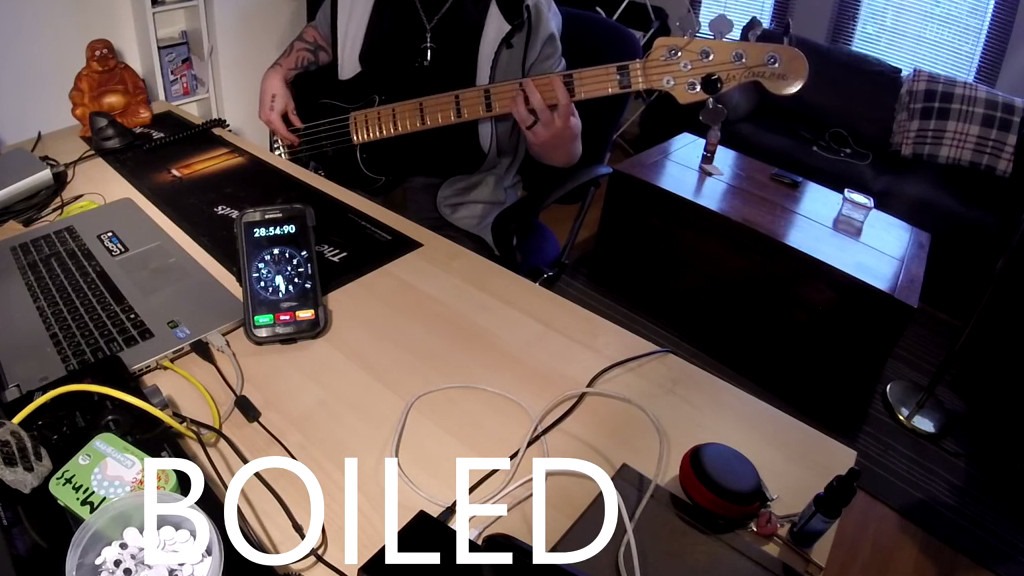You may have heard there’s a way to freshen roundwound bass strings just by boiling them.
Does it work?
Before answering that, it’s helpful to explain what boiling strings actually does for them.
Over time, bass strings get grime pushed into them. And no matter how often you clean your strings, once grime gets in there, it’s very difficult to get out. What boiling the strings does is simply loosen and release the grime you can’t get to.
The end result after boiling the strings and reinstalling them on your bass will be a string with a brighter tone, so in effect, yes, boiling strings does work…
…sort of.
If your strings are dented or malformed in some way (maybe they’re really old?), boiling won’t fix that.
Boiled strings usually don’t sound like a new, fresh set. True, they will sound better, but it’s unlikely you’ll get back that piano-like twang like they had when new.
Boiling doesn’t do much for coated strings. If that’s the kind of string you use and the coating has worn off, boiling will not magically bring the coating back.
Video example
(Skip to 5:15 in the video to hear the before-and-after without all the talking.)
You will be able to hear the difference from old/not-boiled to old/boiled. It’s not a drastic difference in tone but you can hear more brightness after the boiling.
The alternative way that requires no boiling at all and does the same job (more or less)
Is there another way to get grime out of a string without boiling? Yes. You can literally break the grime loose with aggressive snapping back of the strings a few times.
Here is a video example of snapping grime loose:
What’s happening in the video above is that when you detune the string, pull, let go and have it smack the frets hard, that snapback does really work to break grime loose.
The only real drawback to this is that while your strings will get some brightness back, if they feel terrible, that won’t change.
Has either method worked for you?
Whether you keep strings on your bass 10 weeks or 10 years before a string change, if you’ve ever done the boiling and/or snapping method for getting the grime out, post a comment and let everyone know if it actually worked for you – even if only partially.




I just buy a new set. They are not that expensive.
The second video – the “slap the $#!T out of them” method – is the method that I use. Boiling strings takes a little more effort than changing strings, but THIS method is much less time-intensive. You can make your bass sound better in 2-3 minutes, no boiling, no replacing. I find I can get DK Marlowe’s trick to work about 3 times before the gunk is so entrenched in the windings that it’s not coming out no matter what. At that point it’s time for a new set, but if I can minimize the time spent on setup/replacement AND cut my string bill in half, that’s a win/win. And the best part is that if you try this and it DOESN’T work for you, you haven’t lost anything but 3 minutes of your time. Do it to one string and compare it to the others so you can really hear the difference.
I tried boiling strings on the advice from a friend about 4 years ago when I first started playing bass. A waste of time in my opinion. Turns out he used Ernie Ball Super Slinkys and was just too cheap to buy quality strings! I tried using different strings looking for that bright popping ‘new’ sound that would last more than a month and ended up with Elixirs. More money but 10 months later they still sound great so I have been using them for the past 3 years or so.
I’ve found that boiling gives a marginal improvement at best. But I have used a method for years that can bring bass strings back to their full ORIGINAL- yes! – brightness, and do it over and over again. Now understand, there is such a thing as “inherent mechanical life” to a string; so eventually, getting the gunk out won’t help you: wear on the windings and metal fatigue in the core will cause the harmonics to drift out of tune with the fundamental. But even now, I have strings that I’ve been using for over 10 years that are still as bright as ever, I am not kidding. Once you get into this, you find that there is no need to buy only the cheap bass strings. I buy whatever I like the most, without much thought about the cost because they last and last.
Go to the hardware store and get a length (long enough for the playing length of your strings) of 5/8″ (inside diameter) PVC pipe, a cap for said pipe, and PVC glue. This is a one-time purchase. Also, get some denatured alcohol and a small funnel so you can fill the pipe with the alcohol.
Take it all home, cut the pipe to length, and glue the cap on the pipe. Put your strings in the pipe, ball ends first, with the tuner ends sticking out. Fill the pipe with the denatured alcohol and leave it propped in a corner overnight. That’s it! In the morning you can dump the alcohol back in the can and use it over and over again. Take the strings out, let ’em dry and put them back on your bass. Voila! Just like new.
By the way, denatured alcohol is actually ethanol, the kind that’s in whisky. Don’t drink it!! It has a poison added to make it undrinkable, so that it’s not subject to the alcohol tax. But the point is, the fumes are not going to kill you, it is pretty mild stuff as a solvent.
I’m passing on the method from a player named Mike Childree, a fellow member of the now-defunct bass discussion group called The Bottom Line. Thanks Mike!!!
Great stuff here Vic, makes a lot of sense.
I’ll definitely try this.
Thanks for sharing
I don’t doubt your experience, but I’m curious: Don’t bass strings stretch out over time and finally become unable to keep tune? Even if they did, however, getting even 2 years out of a set of strings is a feat, to say nothing of 10… 🙂
Yes indeed, DNA works. I’m starting on the 6th month of using some LaBella flats, which I like in their ‘brand-new’ state. An easier method is to just keep a Tupperware tub of DNA and coil them up for a soak whenever they get dull sounding. Also, a quick rubdown works in between soakings. (sometimes I just clean the E string to keep them balanced sounding)
Vic, Thank you for sharing the DNA (Denatured Alcohol) string cleanse method! I boiled my strings back in the 1970’s because I was a struggling musician and $20+ for new strings was difficult. It worked 1-2 times and then they were shot! 40 years later I’m still playing Bass primarily outside in humid Florida weather. Nothing kills your bright ringing strings quite like 90% humidity and human sweat! I’ve avoided changing strings for the past hot 6-months because they were toast after one gig. So, I tried the DNA method you shared on my 5-string and YES they came back to life. Can I get an Amen? Total investment was around $12 for the pvc pipe and small can of DNA. it’s VERY important to get a small funnel or you will spill the precious DNA when returning it back in the can.
Does boiling Strings help bring them back to life if even for a short time? My answer, absolutely! If you’re a bass player on a budget and/or you’re starting out and you’re learning what to do and how to do it when it comes to strings, I say get a pot of water, boil the water and drop your strings in it! After about 10 to 20 minutes, take them out, dry them off, and put them back on your bass! You WILL notice a difference. If you have plenty of money and can change your bass strings whenever you feel you need to… GO FOR IT! Boiling your bass strings is for bass players on a budget or the budget minded bass player. Good luck!
I tried boiling many years ago …. I agree with the article – it brightens the strings slightly, but not enough to make me want to be bothered frankly and that nice piano twang of fresh strings really doesn’t come back …. if it produces a sound that you like then carry on – but it doesn’t deliver the goods for me …..
I used to travel with a small electric hot pot for this purpose. The trick, for me, was to add a teaspoon of Cream of Tartar to the boiling water before coiling the strings and dropping them in for 20 minutes.
This mixture is what people used for hundreds of years to polish their fine silver and remove tarnish.
Any grocery store will have it in the spice section.
Boiling strings saved me a small fortune during the years I did shows 6 nights a week.
Every Friday put on new strings.
Still sound great Saturday night.
Sunday they rested, Monday sounded good, but losing some zing and flexibility.
Boil ’em and back to new for Tuesday and Wednesday.
Boil ’em again for Thursday and by the end of the show the life was pretty much beat out of them.
NEW SET!!
Loved new set Fridays!
Yes, yes, yes. Apparently my hands are on the sweatier side of the human mainstream, and I could get 2 or 3 boilings out of a cheap set. My addition to this topic is to add a little Dawn dishwashing liquid to the pot. Agree with all who said they never went back to brand new, but for someone with a young family and tight money, it really helped a lot.
By the way, I have also since switched to Elixirs which really keep the new sound for like a year. They are a twinge not as bright as naked nickel rounds, but they stay the same for SO much longer.
In my salad days(1 bass, no tuner, 1 amp, & $20. was a lot of money to spend if you wanted that ‘piano/Johnny Twinkle) tone) I’d boil em’ before the Sat. nite gig.
Yes they sounded better,………for the 1st set. Then deads-ville.
Kind of a hassle to un-string, boil, then re-string the same ones.
Wears the wrap @ the nut-end too.
If it’s no big deal, then try it, & do it.
Or wait till yer faves are on sale…….wherever you pick em’ up.
For both electric and acoustic metal stringed instruments: if you do not mind the temporary smell and have a durable fingerboard material (one that experiences no absorption): I recommend wiping the full active length of each string, all around, with Hoppe’s Nitro Power Solvent No. 9. It brings back the newness characteristics in a truly striking fashion by removing all fouling and residues.
I boil my strings with a little alcohol and I notice a big difference , the dirt floats to the top
I boil my strings with Rubbing Alcohol and I notice a big difference every time for decades
I boiled them way back when but, like mentioned by others, it was a one shot deal.
I use D’Adarrio’s on my Fenders for blues and rock gigs and use Elixir’s on my Ibanez’s for Church and other Christian Music gigs and Elixir’s on the acoustics, I believe that I get more life out of my strings these days by just wiping them with a good string cloth after each song. Not everyone has that opportunity after each song, sometimes you do sometimes you don’t, if you can it seems to keep your strings young even if you’re not!!! 🙂
Warm water and a little dish soap with warm water rinse works a little better.
Guess I should point out that most of us will not want to leave the strings off of an instrument overnight. The solution to that, of course, is to put a different set on, clean the strings you just took off and store them for later.
Also. Brand-new strings are extra-bright at first, and take an hour or so to settle in to the “real” tone of the string. Wolfgang Vogl, lead engineer at Thomastik-Infeld, once told me, “If you like to change your strings after only a couple of sets, you really don’t like those strings, because you’re getting rid of them before they even show you their true tone.” No method of cleaning can bring back that straight-out-of-the-package tone. If that’s what you like, try to find a brighter string!
I use a table spoon of baking soda, it neutralises the acid on the strings, from your hands, and cleans the strings. DO NOT USE AN ALUMINIUM PAN!!
I use a 40mm pvc tube slightly longer than the longest string with two end caps, one glued in place and the other removable. Pop your strings in and fill with methylated spirit. Stand upright with the glued cap down and leave overnight. Works a treat and saves $60.00 a hit for strings that don’t really ‘wear out’. Easier than it sounds.
I used to boil strings back in the 80’s when they were more expensive – or I was poorer. Or both 😀 no – wait – I am still poor!
It’s funny to keep seeing this come up. You’ll get an extra few days out of them, but they go downhill fast – and I had some strings break very quickly.
better to get some clean alcohol on them and wipe them down after use with a micro fibre. Even just wiping them down will yield better results in the long run.
Find a longer life string if you need to boil all the time.
I’ve tried boiling and beating the grime out of them; both work to a degree but nothing is like a new string so I just replace them. The metal will fatigue over time and the core will stretch so the windings have larger gaps for grime to get in.
Also it helps to wash your hands before!
My solution? Flatwounds! As Jamerson said when asked why he never changed strings, he was reported to have said something along the lines of “The gunk is part of the funk.”
Have been boiling strings for decades, works great when you need that snap back in the sound until you put a new set on.. if youa have several basses to maintain for your work boiling will save you $$$. Whoever said strings are not that expensive must own only one bass
When I first started playing bass back in 1975 (age of 13) strings were expensive. I was only getting $5 to mow a lawn so buying a new set of strings was expensive. I think my selections back then were Fender, Rotosound and GHS. The closest music store to me was really into Rotosound which was the only bass string they kept instock. The Rotosound strings used to suck up dirt and seemed to die quickly. My mom used to use the Cream of Tarter method for cleaning her silver so like ZTONIC, I used that method which worked well on the Rotosound’s. I would boil these strings once a month and would try to get 6 months of use before changing.
Now I am a local dealer for DR Stings so I can afford to change once a month now, lol.
Lads and Lasses, I normaly boil egs – not strings. This is no seacret. Small Ultra Sonic cleans strings without heat. Only dish soap 30/50 to wather. Srings under about 15-30 min. and that´s that. Your bass strings has new bright sound again! Works all stings.
https://www.youtube.com/watch?v=YR5PgwEDFzs
Beleave me or not – I have tested! `coase I have it 🙂
All the best to all string boilers!
I use tape wound bass strings. Beautifully smooth don’t get the grime and muck in them. A quick wipe over a couple of times with a cloth and there you have it
Does anyour know where I can get a left handed Burns 4 string Bass guitar?
I just use Valvoline brake cleaning fluid without takin’ the strings off.
just protect the bass and neck with a huge towel and spray the shit down ! clean as hell and no time to wast ! in between performances ten minutes before the showdown !